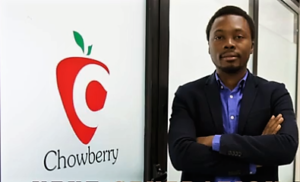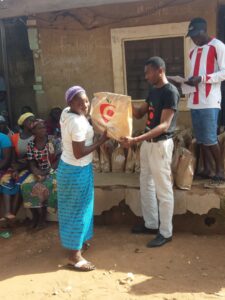 Following the recently concluded Pre-Summit of the UN Food Systems Summit, the Commercial Law Research Network Nigeria (CLRNN) reflects on food waste and food systems in Nigeria through a conversation with Oscar Ekponimo, founder and CEO of Chowberry.
Following the recently concluded Pre-Summit of the UN Food Systems Summit, the Commercial Law Research Network Nigeria (CLRNN) reflects on food waste and food systems in Nigeria through a conversation with Oscar Ekponimo, founder and CEO of Chowberry.
Chowberry applies innovation, technology and research to improve food systems. The Chowberry app reduces food waste and feeds hungry families by connecting consumers to food and produce at risk of going to waste due to expiration or poor sales. Incorporated in 2016 and inspired by Oscar’s childhood experience of hunger, Chowberry’s vision is to reorder the food system into a self-sustaining decentralised structure by which human communities are empowered to control and influence their food and nutrition needs, thereby guaranteeing their well-being. Since its incorporation, Chowberry has engaged in collaborations and knowledge sharing with global institutions and top food brands including Barilla Group, Food Tank, Rolex SA and the British Council.
Commercial Law Research Network Nigeria (CLRNN): Chowberry applies innovation to transform food systems. Can you provide insights into how Chowberry executes its impressive objective?
Oscar Ekponimo (OE): We leverage technology to address the challenges we have identified in the food system. One of those challenges is food waste. We realise that there is an important connection between food waste and hunger. There is no reason why people should be hungry when there is so much food. The Chowberry app uploads data on food products that are approaching the end of shelf life or that remain unsold in supermarkets. In an automated and systematic way, we connect individuals and families that are facing hunger with NGOs to acquire food products at discounted prices. We have data from food manufacturers on food that is approaching expiration. Say a 5 kilogramme of semolina that could be sold in the open market for 3,800 NGN. But because it is approaching the end of shelf life and it needs to leave the hands of those manufacturers (otherwise, it would be wasted), we work with the manufacturers to reduce prices. The price can fall from 3,800 NGN to as low as 1,000/1,200 NGN. Since 2016, we have distributed 1.5 million meals to people facing hunger.
CLRNN: The hunger crisis in Nigeria has been exacerbated by the Covid 19 pandemic. Could you tell us about the scale of food waste in Nigeria?
OE: You may not find accurate data on food waste in Nigeria, you will find more information about Africa generally or global levels. However, in 2017, the Minister of Agriculture noted that 30 to 40 per cent of food produced in Nigeria is wasted. I agree with those figures. If you travel around the areas where there is large-scale farming (like Benue state), you will see farmers by the roadside with baskets of fruits and vegetables like mangoes and potatoes – much of which eventually gets spoilt and wasted. There are wide-ranging challenges that amplify and exacerbate food waste and food loss. For example, you have challenges of access to markets. In some instances, after harvesting, there are no immediate off-takers. This is why I am a strong advocate for the decentralisation of the food system.
We should localise and establish value addition industries. If a particular locale – say Benue (in the North Central region) is producing lots of mangoes and oranges, they do not need to wait for processors from the South West to get their fresh produce to create fruit juice. Why don’t we establish processing companies around the harvesting sites? We also have a poor cold chain in the country. Perishable items like vegetables and fruits go to waste because of inadequate cold chains. In addition, inadequate logistics amplifies food waste. For example, you have roads that are in poor conditions, which makes it challenging to transfer food from point A to point B (food from the farm to processors or from farm to plate). These challenges contribute to food waste in Nigeria. From the manufacturers’ perspective, you have the challenges of fragmented supply chains. There are too many middlemen – time passes before the food goes from the warehouse to the actual consumers hands – a lot is lost within that timeframe. All these compounds the problem of food waste. It is a problem that needs to be addressed.
CLRNN: Please discuss Chowberry’s work with internally displaced persons in Nigeria
 OE: When we first started, we worked directly with supermarkets. Consumers used the Chowberry app to order and collect listed food products from supermarkets at discounted prices. However, the poor and indigent people do not have access to smartphones and the internet. Therefore, we started to work with NGOs to address this. An example of such NGO is the International Christian Centre (ICC), an organisation that manages the IDP camp in Benin City. We worked with them because Honeywell distributors in the North (with whom we already had a relationship) told us that they had tonnes of products approaching the end of shelf life, from flour/wheat flour, semolina to pasta, amongst others. At the same time, there were about 3,000 people who faced hunger in that IDP camp. Our platform was used to facilitate the redistribution – getting the food produce from Honeywell, delivering it to ICC, and ICC using it to feed over 3,000 people. That is a typical example of the work that we have done.
OE: When we first started, we worked directly with supermarkets. Consumers used the Chowberry app to order and collect listed food products from supermarkets at discounted prices. However, the poor and indigent people do not have access to smartphones and the internet. Therefore, we started to work with NGOs to address this. An example of such NGO is the International Christian Centre (ICC), an organisation that manages the IDP camp in Benin City. We worked with them because Honeywell distributors in the North (with whom we already had a relationship) told us that they had tonnes of products approaching the end of shelf life, from flour/wheat flour, semolina to pasta, amongst others. At the same time, there were about 3,000 people who faced hunger in that IDP camp. Our platform was used to facilitate the redistribution – getting the food produce from Honeywell, delivering it to ICC, and ICC using it to feed over 3,000 people. That is a typical example of the work that we have done.
CLRNN: What are the legal and policy frameworks relevant to food waste in Nigeria?
OE: Food is generally regulated by the National Agency for Food and Drug Administration and Control (NAFDAC) Act, Laws of the Federation of Nigeria Cap N.1 2004. The NAFDAC Act provides for “date marking” and “date of minimum durability” whether it is “best before” “use by” or “expiry” dates. There are also have environmental laws. For example, in Abuja, there are the Abuja Municipal Area Council Officials who inspect grocery stores and check for food produce that is approaching the end of shelf life or expiration. They have a wide range of sanctions for breaches to their laws. At the state level, Lagos State has the Lagos State Consumer Protection Agency Law of 2014, which includes provisions on labelling and expiration dates. For example, baby food should be off the shelf 21 days to its expiration date. Food products that are approaching the end of shelf life should be separated from the main aisles and labelled clearly. We craft agreements to set the rules of engagement with the entities with which we work. In terms of the way we either handle the food or distribute them, we have indemnification – from the manufacturer to us, and from us to the manufacturer.
CLRNN: What changes to the food system (legal and non-legal) would you like to see in Nigeria and at the international level?
OE: At the national level, it would be great to have laws that incentivise corporate organisations to actively participate in the food system, either by providing access to food or providing sustainable means of reducing food waste. For non-legal changes, we should have better infrastructure, storage, and logistics. We would also need an improved cold chain and the decentralisation of the food systems. If a particular area in location x of the country produces cassava, there should be a cassava plant within a 100/250 kilometre radius, as opposed to the other end of the country.
At the international level, it would be great to see the democratisation of the food system. For example, why is 75 per cent of cocoa produced in Africa not processed in Africa? The value is added outside of Africa and then resold as chocolate at a premium. The same thing with maize. Why would a big corporation come to a particular farming community – buy out all the maize and resell to the same community as cornflakes. The democratisation of the food system would empower farmers and local communities to take ownership of value addition for their produce.
CLRNN: To conclude, please share your highlights in relation to Chowberry?
OE: Seeing the smiles on the faces of children and adults whom we have been privileged to impact through the work that we do. You would have to be in their shoes to understand how that is much of a relief to them. We are proud to be able to touch even one life through the work that we do. One of the core lessons learned is that impact can be accomplished by taking the simplest steps; you can impact people by just going out and taking action. For the future, we are looking to scale our work to other countries that have similar interconnected challenges of food waste and hunger.
CLRNN: Oscar Ekponimo, Founder and CEO Chowberry, thank you.
Picture 1: ypard, pictures 2&3: chowberry.
